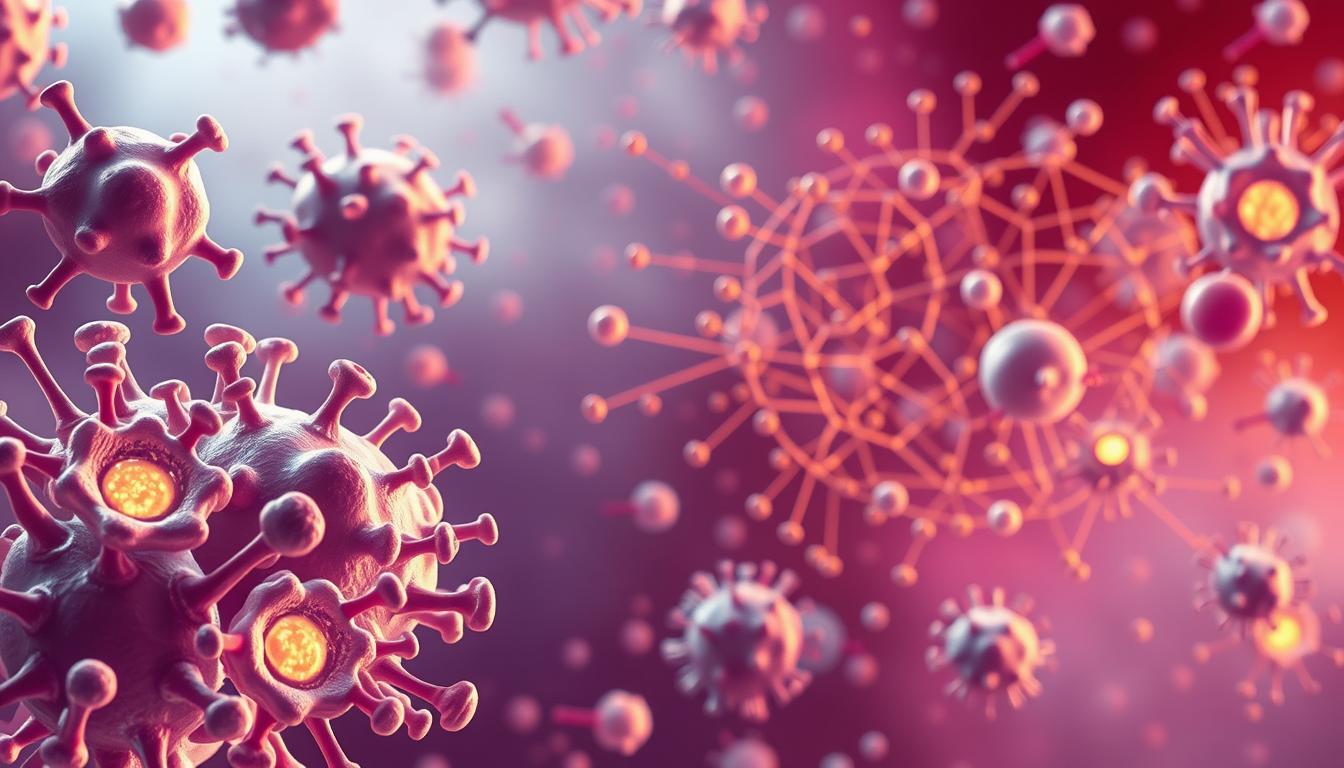Did you know your body makes about 10 million different antibodies every day? This amazing defense works hard to keep you safe from many dangers. It’s your body’s top protector of health.
Your immune system is a complex network of cells, tissues, and organs. They all work together to fight off harmful invaders like bacteria and viruses. It’s like your body’s own security team, ready to defend you from harm.
Learning about your immune system can help you make better health choices. It’s amazing how white blood cells fight infections and how different parts of your immune system work together. This incredible defense is truly miraculous.
Key Takeaways
- The immune system generates millions of antibodies daily
- Your body has a sophisticated defense mechanism
- Immunity protects against diverse microscopic threats
- Understanding immune function helps improve overall health
- The immune system is a complex, intelligent network
What Is the Immune System: Your Body’s Natural Defense
Your immune system is like a top-notch security system inside you. It keeps watch for harmful invaders like viruses and bacteria. It’s always ready to defend you.
The immune system has many parts working together. These parts include organs, cells, and proteins. They form a strong defense to keep you healthy.
Core Components of Immune System
- Bone marrow: Produces white blood cells
- Thymus: Develops critical T-lymphocytes
- Spleen: Filters blood and removes damaged cells
- Lymph nodes: Filter harmful substances
Threat Identification Process
White blood cells are key in finding threats. They roam your body, spotting and fighting off harmful microorganisms. They’re like tiny security guards, always on the lookout for danger.
| White Blood Cell Type | Primary Function |
|---|---|
| Neutrophils | First responders to infections |
| Lymphocytes | Create targeted immune responses |
| Macrophages | Consume and destroy foreign particles |
White Blood Cells: Immune System Warriors
Your white blood cells are the first line of defense. They watch over your body, ready to act against infections or damage. By fighting off threats, they keep you healthy and safe from sickness.
“The immune system is a complex and intelligent network that adapts and learns to protect the body from various threats.” – Immunology Research Institute
The Guardian of Life: Immunity Explained
Your body’s immunity is like a top-notch defense system. It works non-stop to keep you safe from harmful invaders. This complex network of cells and tissues is your personal security team. It always watches and acts fast to threats.
The immune system’s main job is to protect your body from pathogens like viruses and bacteria. It uses smart ways to find and stop health risks before they harm you.
- Recognizes foreign substances instantly
- Creates targeted defense strategies
- Develops long-term memory against specific threats
Disease prevention is key to your immune system’s work. It doesn’t just fight infections but also remembers past battles. This helps it respond quicker and better next time.
“Your immune system is a complex and remarkable network that never sleeps, protecting you every second of every day.” – Dr. Emily Rodriguez, Immunology Researcher
Imagine your immune system as a smart security network that gets better with time. It uses white blood cells, antibodies, and proteins to keep you healthy and strong.
Learning about your immune system can help you support it. You can do this through your lifestyle and what you eat.
Types of Immunity: Innate vs. Adaptive Responses
Your immune system is a complex network that keeps you safe from harm. It’s made up of different types of immunity. These help your body fight off infections and stay healthy.
The human immune system uses two main strategies: innate and adaptive immunity. Both are key to protecting you from health threats.
Breaking Down Innate Immunity
Innate immunity is your body’s first defense. It acts fast, without knowing the exact threat. This quick response happens within minutes or hours of exposure.
- Includes physical barriers like skin and mucous membranes
- Activates white blood cells immediately
- Provides quick, generalized protection
Understanding Adaptive Immunity
Adaptive immunity takes longer to develop but offers targeted protection. It’s specific to certain pathogens, creating a more advanced defense.
| Characteristic | Innate Immunity | Adaptive Immunity |
|---|---|---|
| Response Speed | Immediate | Slower, more targeted |
| Specificity | Non-specific | Highly specific |
| Memory | No memory | Creates memory cells |
Memory Cells and Long-term Protection
Memory cells are vital for adaptive immunity. These cells remember past infections. This means your immune system can fight off the same pathogen faster next time.
“Your immune system is like a well-trained army, with memory cells serving as experienced soldiers ready to defend against known enemies.” – Immunology Expert
Knowing how innate and adaptive immunity work together helps you see the amazing defense system in your body every day.
Factors That Strengthen Your Immune System
Your immune system is a strong defense against sickness. It needs care and attention to stay strong. Good health habits are key to boosting your immunity.
“A strong immune system is your body’s natural shield against illness and disease.” – Dr. Emily Rodriguez, Immunology Specialist
Several key factors help strengthen your immune system:
- Proper nutrition with immune system boosters
- Regular physical activity
- Adequate sleep patterns
- Stress management techniques
- Hydration and balanced lifestyle
Nutrition is a big part of keeping your immune system strong. Eating foods full of vitamins and minerals helps a lot. Vitamin C, zinc, and antioxidants are especially good for your immune health.
Your daily habits affect your immune system a lot. Getting enough sleep, eating well, and managing stress are all important. They help your immune system work its best.
Experts say to support your immune system in a complete way. This means more than just eating right. It’s about making lifestyle changes that help your body stay healthy and strong.
Lifestyle Habits That Impact Immune Function
Your daily habits are key to keeping your immune system strong. Knowing how lifestyle choices affect your immunity can help you fight off health issues better.
Sleep and Immunity: Your Nighttime Defense Mechanism
Good sleep is a big help in keeping your immunity strong. When you sleep deeply, your body makes and sends out important immune cells. These cells help fight off infections. Not getting enough sleep can make you more likely to get sick.
- Aim for 7-9 hours of uninterrupted sleep nightly
- Maintain a consistent sleep schedule
- Create a dark, cool sleeping environment
Exercise Benefits for Immune Health
Regular exercise is great for your immune system. It helps make more immune cells and lowers inflammation. This makes your body’s defense stronger.
| Exercise Type | Immune System Impact |
|---|---|
| Moderate Cardio | Increases immune cell circulation |
| Strength Training | Reduces inflammatory markers |
| Yoga | Lowers stress-related immune suppression |
Stress Reduction Techniques
Too much stress can really hurt your immune system. Using good stress management can keep your immune system balanced and ready to respond.
“Your mind and body are interconnected. Managing stress is not a luxury, but a necessity for immune health.” – Dr. Elizabeth Roberts, Immunology Specialist
- Practice daily meditation
- Engage in deep breathing exercises
- Maintain social connections
- Seek professional counseling if needed
By focusing on sleep, exercise, and managing stress, you can build a strong immune system.
Nutrition and Immunity: Foods That Fight Disease
Your diet is key to keeping your immune system strong. It’s not just about eating to live; it’s about eating to stay healthy. The right foods can boost your body’s defenses.

Some nutrients are super helpers for your immune system. Vitamin C in citrus fruits and bell peppers boosts white blood cells. Foods rich in zinc, like lean meats and nuts, help your immune cells grow.
- Citrus fruits (oranges, grapefruits)
- Leafy green vegetables
- Garlic and ginger
- Berries and mushrooms
- Yogurt with probiotics
“Let food be thy medicine and medicine be thy food” – Hippocrates
It’s also important to know which foods can hurt your immune system. Foods high in sugar, alcohol, and processed ingredients can weaken it. Eating whole, nutrient-rich foods is the best way to keep your immune system strong.
| Food Category | Immune-Boosting Properties | Recommended Servings |
|---|---|---|
| Citrus Fruits | High Vitamin C | 2-3 servings daily |
| Lean Proteins | Zinc and Amino Acids | 1-2 servings daily |
| Fermented Foods | Probiotics | 1 serving daily |
A balanced diet is your best defense against illness. Eating well consistently helps your body fight off infections better.
Common Immune System Disorders and Solutions
Your immune system is key to keeping you healthy. But sometimes, it can go wrong. Learning about autoimmune diseases, immunodeficiency disorders, and treatments can help you deal with these health issues.
Autoimmune Conditions: When the Body Attacks Itself
Autoimmune diseases happen when your immune system attacks healthy cells. These diseases can harm different parts of your body, making life tough for those affected.
- Rheumatoid arthritis impacts joint tissues
- Multiple sclerosis attacks nerve coverings
- Type 1 diabetes disrupts insulin production
Immunodeficiency Disorders: Weakened Immune Responses
Immunodeficiency disorders weaken your body’s defense. These can be mild or severe, making you more likely to get sick.
“Knowledge is the first step in managing immune system challenges” – Dr. Emily Richardson, Immunology Specialist
Treatment Approaches for Immune Disorders
Dealing with immune disorders needs a detailed plan. Doctors usually suggest treatments that fit each person’s needs.
- Medication to suppress or modulate immune responses
- Lifestyle modifications
- Regular medical monitoring
- Targeted nutritional support
New research is finding better ways to treat autoimmune and immunodeficiency disorders. This gives hope for better health outcomes for patients.
Modern Advances in Immunology Research
The world of immunology research is changing fast, bringing new insights into how we fight off diseases. Scientists are finding new ways to help our bodies heal, changing healthcare for the better.

New discoveries in immunology are showing promise for treating tough medical problems. Researchers are using advanced technologies to tap into our body’s natural defenses:
- CRISPR gene editing techniques for immune system modification
- Personalized immunotherapy treatments
- Advanced vaccine development strategies
- Artificial intelligence in predictive immune response modeling
“The future of medicine lies in understanding and manipulating our immune system’s incredible potential.” – Dr. Elena Rodriguez, Immunology Research Institute
New methods are changing how we see the immune system. Precision medicine lets doctors tailor treatments to fit each person’s unique genetic makeup. This opens up new ways to fight diseases that were once hard to beat.
| Research Area | Potential Impact |
|---|---|
| Immunogenomics | Personalized disease prevention |
| Nanomedicine | Targeted immune system interventions |
| Immunometabolism | Enhanced understanding of immune responses |
Your immune system is more than just a defense—it’s a complex network of biological intelligence. As research in immunology keeps moving forward, you can look forward to more advanced, precise, and effective ways to stay healthy and prevent diseases.
Conclusion
Your immune system is a powerful defense against many health threats. It’s key to keeping you well. Every choice you make affects how well your body protects itself.
To keep your immune system strong, you need to take care of it. Eating right, managing stress, exercising, and sleeping well are all important. Learning about lifelong immunity helps you make better choices for your health.
Science shows how complex our immune system is. It uses white blood cells, antibodies, and proteins to fight off dangers. Taking a holistic approach to immune health means using prevention and knowledge to your advantage.
Think of your immune system as your personal guardian. By following the tips from this article, you can boost your health and keep your body safe. This will help you stay healthy for many years.




